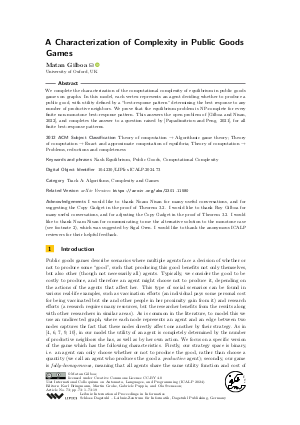LIPIcs.ICALP.2024.73.pdf
- Filesize: 0.83 MB
- 19 pages

 Creative Commons Attribution 4.0 International license
Creative Commons Attribution 4.0 International license

We complete the characterization of the computational complexity of equilibrium in public goods games on graphs. In this model, each vertex represents an agent deciding whether to produce a public good, with utility defined by a "best-response pattern" determining the best response to any number of productive neighbors. We prove that the equilibrium problem is NP-complete for every finite non-monotone best-response pattern. This answers the open problem of [Gilboa and Nisan, 2022], and completes the answer to a question raised by [Papadimitriou and Peng, 2021], for all finite best-response patterns.
Feedback for Dagstuhl Publishing